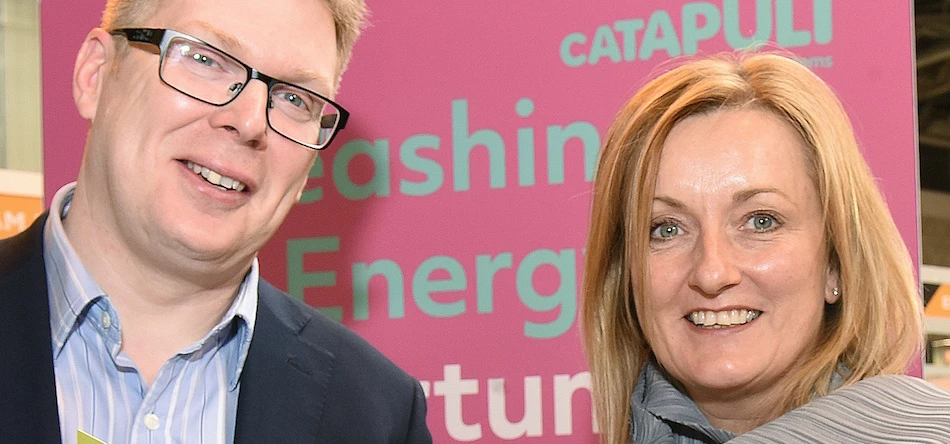
Ellesmere Port’s EIC plots action on energy sector innovation
Gas and electricity networks could do more to adopt the innovations of the sector’s small and medium-sized enterprises (SMEs), according to a new report.
Research from the Ellesmere Port-based Energy Innovation Centre (EIC) and the Energy Systems Catapult has shed light on the relationship between the UK’s energy networks and SMEs, identifying the biggest barriers to the uptake of innovative new ideas.
The paper, known as The #CollectiveFuture Insights, was backed by the EIC’s network partners and unveiled this week (May 24) at Utility Week Live.
The study, conducted earlier this year by independent research firm Renuma, saw more than 150 SMEs come forward to share their experiences of engaging with the UK’s gas and electricity distribution networks.
EIC’s various network partners – including UK Power Networks, SP Energy Networks and Northern Powergrid – were also asked to discuss their experiences of working with third-party innovators.
According to the research, the vast majority (80%) of SMEs had engaged with at least one distribution network operator or gas distribution network. While larger SMEs (those with over 100 employees) were more likely to be engaged, all sizes of SMEs reported collaborating successfully with networks across sectors.
The survey also showed that initial engagement is likely to lead to collaboration and network innovation funding is crucial for SMEs engaging with this sector.
Another insight highlighted 10 areas for improvement that, according to the SMEs surveyed, would positively impact relationships and help accelerate the adoption of innovation into business as usual.
The chief exec of the Energy Systems Catapult, Philip New, said: “Innovation is fundamental to energy system transformation.
“Leveraging the potential of innovative SMEs is vital if we’re to access the full capacity of UK talent and drive productivity improvements.”
He continued: “This involves overcoming some serious challenges. We need focussed interventions based on a clear understanding of the landscape.
“Our aim is to help remove roadblocks and smooth the path for the strongest innovations to break through.”
Energy Innovation Centre MD Denise Massey commented: “Whilst networks are adopting SME innovations into business as usual, it is clear from the findings that there is still work to be done.
“The study is the first step in an action plan to create stronger relationships between third party SMEs with innovative ideas and technologies, and the energy networks that benefit from them.”
She continued: “Our intention is that these insights will help us to reach a point where collaboration can thrive and barriers to adoption are removed so that we start to see a greater number of SME innovations breaking through at a much quicker pace.”
The head of business development at Energy Systems Catapult, Paul Jordan, believes the study offers “invaluable insight and engagement”, putting the Catapult and its collaborators in a “fantastic position to be able to move forward and build upon these foundations”.
He added: “We haven’t got all the answers yet but we can now start to address and further investigate these challenges.
“Ultimately, by understanding the needs of SMEs we can improve the innovation process and help them access the tools, partners and information needed to successfully commercialise innovation.”
The EIC launched its partnership with the Energy Systems Catapult back in 2015.
Looking to promote your product/service to SME businesses in your region? Find out how Bdaily can help →








 Navigating the messy middle of business growth
Navigating the messy middle of business growth
 We must make it easier to hire young people
We must make it easier to hire young people
 Why community-based care is key to NHS' future
Why community-based care is key to NHS' future
 Culture, confidence and creativity in the North East
Culture, confidence and creativity in the North East
 Putting in the groundwork to boost skills
Putting in the groundwork to boost skills
 £100,000 milestone drives forward STEM work
£100,000 milestone drives forward STEM work
 Restoring confidence for the economic road ahead
Restoring confidence for the economic road ahead
 Ready to scale? Buy-and-build offers opportunity
Ready to scale? Buy-and-build offers opportunity
 When will our regional economy grow?
When will our regional economy grow?
 Creating a thriving North East construction sector
Creating a thriving North East construction sector
 Why investors are still backing the North East
Why investors are still backing the North East
 Time to stop risking Britain’s family businesses
Time to stop risking Britain’s family businesses